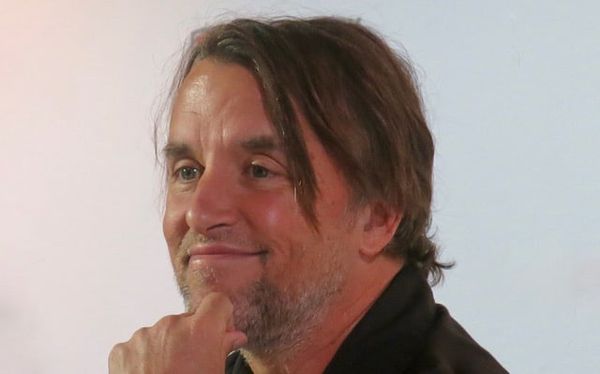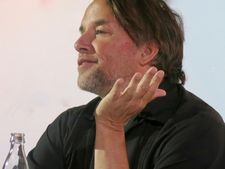 |
| Richard Linklater in Karlovy Vary: "I have always liked dialogue and human communication although I myself am kind of quiet.” Photo: Richard Mowe |
Film-maker Richard Linklater has resolutely plowed his own independent path from his début with Slacker. Just occasionally he has flirted with Hollywood. He lives and works mainly in Austin, the Texan city he has helped to put on the cultural map along with its music scene. He was a founder of the Austin Film Society which has helped many film-makers get a foot on the ladder. Its significance and influence is being celebrated at this year’s Karlovy Vary International Film Festival. Meanwhile he has a new film in the offing with Cate Blanchett. Linklater talks about his roots, inspiration, indie cinema, Boyhood, and why newcomers have to be driven, strong, single-minded and a little crazy.
Q: What is it about your home town of Austin that makes it such a seeming hive of creativity?
Richard Linklater: If you grew up in the south in some small town it is the sort of place you escaped to, to get out of where you lived. It has a big college and it was primarily known for its music scene - Willy Nelson lives there. It is a kind of cultural oasis. Texas is a rather conservative state but Austin is a pretty liberal town. I moved there because I could not afford to live in Los Angeles so I decided to stay there and work. I was envious of the music culture so we decided to build up the movie culture. Austin has become a rather large city now and rather different from the place portrayed in Slackers. It was a smaller town then and there was nothing going on. Now there are huge skyscrapers rather than abandoned buildings. It is the 11th largest city in the States and it is getting bigger.
Q: Slackers is such a verbose movie - full of words. Why so much dialogue?
 |
| Richard Linklater on Hollywood: "The studios seems a bit abstract to me now - even after the success of Boyhood they did not come calling for my next film.” Photo: Film Servis Karlovy Vary |
RL: I had made a film before that one with hardly any dialogue. It was mainly a visual experience. I was beginning to find my voice so I thought that in Slackers what if all these lonely and isolated and alienated people suddenly started talking. So I wrote a monologue. I had been in acting classes for years and had done lots of monologues. So I was used to that format. Along the way I realised that it was one person doing all the talking and the other one doing all the listening. There was not a lot of exchange. That appealed to me. That seemed to set a tone. Ethan Hawke [one of Linklater’s favourite actors] has made a joke that films are very often pages of description and action and very little dialogue. He says my films are just pages of dialogue and in fact that is the way they are. I have always liked dialogue and human communication although I myself am kind of quiet, actually. I don’t sit around talking and prefer reading quietly. I don’t like to hear myself talk.
I thought that people trying to talk in itself was cinematic. In film school they teach you that films don’t talk about things, but should show things but I never liked those rules and I thought that talking about things could be way more evocative than showing things. Your own imagination is often better than the reality. If you can evoke something that can be more interesting.
Boyhood took 12 years to make but it was an independent side-project we were doing. It did not feel like I was making an epic. It was more like a time experiment. We would shoot about three days a year and it was like a super low budget independent film. But it started to build up and I knew more than half way through that it was working the way I wanted it to and it was having this cumulative effect. I thought that would be interesting to watch in one sitting - I had not seen that before: characters ageing and changing over time. It was just another cinematic experiment that people seemed to relate to. It was also so ordinary - it could have been called Ordinary People but Robert Redford already had nabbed that title.
Q: Your films seem to be very diverse. Where do you find your inspiration?
RL: That is something you never have to ask yourself - where does your inspiration come from? You just follow your instincts. There are a million stories in the world which all of us encounter. if something does not make sense we make up a story about it. We try to make sense of the world. So something that would be worthy of a film would be something I am trying to find an answer to or some sort of exploration.
 |
| "My advice is not to listen to any advice but to follow your impulses.” - Richard Linklater’s advice to young film-makers in Karlovy Vary. Photo: Richard Mowe |
Q: You always seem to have a European approach to your films. Where does that stem from?
RL: I take that as a bit of a compliment being an American. We all watch the same films and are inspired by the same people. Godard and the French New Wave and the New German Cinema of the Seventies. I can just go on … national movements and times in history. I am a cineaste so I come out of that school. It is just that the notion of cinema is what you are inspired by in your own personality. I don’t think about it too much. I have just come back from a screenwriting workshop in Greece with film-makers from all over the world and it fell in to this cliché of American storytelling versus European story-telling - and I was like what does that even mean? I could see the point that Americans tend to get to the point quicker and tell the story faster. I don’t do that so much.
Q: How has the landscape of Independent Cinema changed?
RL: Like so many things in life the core of it has stayed the same. The world around that impulse of telling personal stories has changed enormously. The cinema landscape today is like science fiction compared to the time when I first got into it. It is so different in the 35 years since I became a film-maker. The idea that you can make a film on a computer and then post it online so everyone in the world can see it is now taken for granted. It is still a crazy notion for a filmmaker. Because of that it is the best time ever to be a communicator.
The other side of that is that there are so many films. When I first submitted to Sundance Film Festival in the early Nineties there were 200 feature films submitted. Now there are 10,000 or so. It was such a big deal to make a film back then. With Slackers to get the money to make it and to have the film processed was such a rare thing. Film-makers would such sit around staring in to their coffee cups saying they had all these great ideas for films, but the System was not allowing them to get them made. Now everyone can make a film - I am not saying everyone should make a film - but everyone can. And that is incredible.
Q: Have you been courted by Hollywood over the years, and if you have, have you ever thought why on earth did they offer me that?
RL: It has been a kind of dance with them my whole life. After Slacker my next production was a studio film - Dazed And Confused was funded by Universal on a low budget. At that time studios would give film-makers six million dollars to go make a movie. They would have their big films and then medium range films. Now they concentrate on mainly on so-called blockbusters. So that has changed. I was one of the beneficiaries of that time when you could get personal films made in the studio system. It would not happen today. I had fun with a couple of studio comedies including School of Rock. You can still make them personal and bring your own sensibility in to play.
 |
| Richard Linklater at the packed screening of Slackers at the Karlovy Vary International Film Festival Photo: Film Servis Karlovy Vary |
Q: Tell us about your new film with Cate Blanchett, Where Did You Go, Bernadette?
RL: This is a large film for me, based on a best-selling novel by Maria Temple, but it was funded by an independent company Annapurna Pictures. We are in post production now and we shot it last Fall. I am really happy about it but it won’t come out until next year now. It is really a mother and daughter story, about a middle-aged couple drifting apart and about an agoraphobic artist who has stopped making art and goes missing. Besides Cate Blanchett, Kristen Wiig is in the cast.
Q: What is your relationship with Hollywood these days?
RL: The studios seems a bit abstract to me now - even after the success of Boyhood they did not come calling for my next film. They know me too well. I get strange offers all the time but most of the time they do need a director like me. For many of the big action films the parameters are already set - they might as well get the stunt co-ordinator to direct it. Mostly I turn down everything that they ask me to do.
Q: Do you do commercials?
RL: I have never done commercials for money, but I have done political ads for a law they are trying to pass etc. They are called public service announcements. I love Texas but as I’ve said it is a very conservative state. The state government has been taken over by the Tea Party - the radical right. They thought they would pass a law called the Bathroom Bill which would ban transgender people from using the bathroom of their choice. It is insane and incredibly discriminatory so we got together to make a one-minute protest ad. I made some anti-Bush ads when he was running for President and they came after me to check my taxes to try to get me in trouble.
Q: Are there certain types of films that the Austin Film Society look out for to support?
RL: We try to support anyone who wants to express themselves and try to make cinema that means something to them personally. There is no specific definition. It can be anything. Independent film is anything and some people start that way and then Hollywood finds a use for them. Others not so much … People who love films love all sorts of films and we are in that category. We show all kinds of crazy stuff - a horror season to a director’s retrospective.
Q: Do you have any advice to give a young film-maker?
RL: There is so much advice available that I am in a kind of anti-advice mode at the moment. If you discourage somebody then the test for the individual is not to hear that. When you make a film and it is turned down by every film festival then you have to get used to the rejection. It is incredible the amount of belief and (let’s call it artistic delusion) that you have to live under to get yourself through these years. It is a lesson to everyone. You have to forge your path. For instance there are so many strong women in the world who have come to directing movies later than they should. Why did they wait an extra ten years to pursue their ambition? You have to be able to plant your flag and you have to proceed. In the arts it is a specific and wilful journey for the individual. You have to be strong and single-minded, a little crazy and really driven. My advice is not to listen to any advice but to follow your impulses. The world will let you know at some point if they want you to continue. That is why I did not go to film school because I did not want anyone telling me what to do.





















